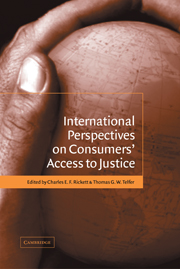Book contents
- Frontmatter
- Contents
- List of contributors
- Preface
- Table of cases
- Table of statutes
- 1 Consumers' access to justice: an introduction
- Part I Perspectives on consumers' access to justice
- 2 Consumer redress and access to justice
- 3 Consumer access to justice in common law countries: a survey of the issues from a law and economics perspective
- 4 Rethinking consumer protection policy
- Part II Issues in contract and tort
- Part III Services and the consumer
- Part IV Consumer bankruptcy law
- Part V Procedure and process issues
- Part VI Conflict of laws issues
- Index
3 - Consumer access to justice in common law countries: a survey of the issues from a law and economics perspective
from Part I - Perspectives on consumers' access to justice
Published online by Cambridge University Press: 11 July 2009
- Frontmatter
- Contents
- List of contributors
- Preface
- Table of cases
- Table of statutes
- 1 Consumers' access to justice: an introduction
- Part I Perspectives on consumers' access to justice
- 2 Consumer redress and access to justice
- 3 Consumer access to justice in common law countries: a survey of the issues from a law and economics perspective
- 4 Rethinking consumer protection policy
- Part II Issues in contract and tort
- Part III Services and the consumer
- Part IV Consumer bankruptcy law
- Part V Procedure and process issues
- Part VI Conflict of laws issues
- Index
Summary
Introduction
Legal disputes are like contracts in reverse. A contract seals the outcome of the parties' negotiations. It avoids uncertainty and saves them the further transactions costs they would incur if the negotiations continued. A dispute keeps the outcome of the parties' engagement in suspense. It prolongs uncertainty and increases their transactions costs. Contracts lead to beneficial exchanges. Disputes lead to costly stand-offs. Dispute resolution benefits the parties in the same way a contract does. It seals the outcome between them, avoids uncertainty and saves further transactions costs. Settlement is a contractual form of dispute resolution. In default of settlement, adjudication may be necessary. Adjudication is a surrogate for the contractual solution.
The benefits of adjudication through the civil justice system are not limited to the parties themselves. There are social benefits as well. First, and most obviously, adjudication lowers the social cost of disputes by facilitating orderly dispute resolution. Rule is cheaper than misrule. A war of words in the courtroom is better than a shoot-out in the main street. This is the corrective justice function of the civil justice system. Secondly, and perhaps less obviously, the civil justice system avoids disputes. It does this by generating judge-made rules to guide future behaviour. When a court awards A (a consumer) a remedy against B (a firm), it internalises to B the cost to A of B's activity. B (and other like parties) will then take cost-effective preventive measures to avoid liability in future cases.
- Type
- Chapter
- Information
- Publisher: Cambridge University PressPrint publication year: 2003
- 7
- Cited by



